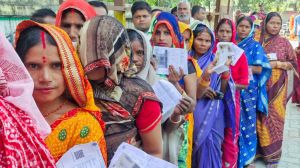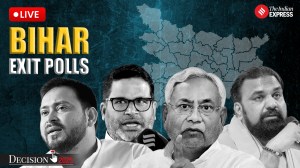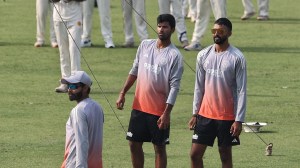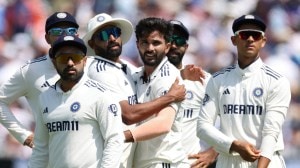Dutiful sons aren’t youth icons
India's power is youth power, goes the new mantra. Seventy per cent of our population is under the age of 35 and they’re going to lead ...

India’s power is youth power, goes the new mantra. Seventy per cent of our population is under the age of 35 and they’re going to lead India’s takeover of the world in the next decades. Narain Karthikeyan has become the first Indian to compete in Formula One. Sania Mirza has become the first Indian woman to reach the third round of an international Grand Slam. All very thrilling. But hang on, folks. Before we get carried away over how youth is shattering the old world, a word about how the old world is still demolishing the young.
One of the great enthusiasms of the last general elections was the rise of a cadre of young MPs. At last Indian politics was acquiring new energy, at last India was set on course to acquiring its Tony Blairs and Bill Clintons. This time last year Rahul Gandhi stopped being quiet and cutesy and announced his decision to contest elections. Around him gathered other GenNext politicians, Jyotiraditya Scindia, Sachin Pilot, Jitin Prasada, Sandeep Dikshit and Kuldip Bishnoi. Voters breathed a sigh of relief and showered them with rose petals of popular franchise. Ajay Maken defeated three-time MP Jagmohan in New Delhi. The neophyte Milind Deora vanquished the elderly Jayavantibehn Mehta in South Mumbai. Dikshit stormed home, so did all the others. Even the patriarchal BJP allowed Barmer boy Manvendra Singh to become a sort of turbaned grassroots poster-boy-with-a-difference.
But alas, a year later, none of those young MPs have either distinguished themselves as charismatic or powerful leaders of people or as heartful orators. They have not been able to announce original ideas. Nor have they been able (or allowed) to significantly challenge geriatric party leaderships by sheer force of personality and achievement. They haven’t been allowed to succeed precisely by the same politics to which they owe their existence: namely the politics of family. Family has brought them political success, but paradoxically family has trapped them in political stagnation.
For fear perhaps that he may be accused of doing too much too soon, Rahul Gandhi has not even spoken once in Parliament. He’s content only to make the low profile monthly visit to Amethi and occasionally voice some squeaky protests against Mulayam Singh Yadav. The articulate Pilot and Deora are both lively television presences but are nowhere near the decision-making structures of the Congress. None of the young MPs, not even the two-time winner and finance professional Scindia, are anywhere close to the Council of Ministers, not one is even a Minister of State, nor have they been given any important organisational posts. Manvendra Singh is only one of the spokespersons of the BJP and that too not even its most visible. In fact in this cabinet, the Minister for Youth Affairs and Sport is the 75-year-old Sunil Dutt. List the ages of the defence minister (70), home minister (70), external affairs minister (74) and HRD minister (75) and you’ll realise that there are no Narain Karthikeyans and Sania Mirzas in the Union cabinet.
Two parallel worlds: Indian society dancing on the buoyant shoulders of the young, and the Indian state, still dependent on the old. No civil servant can become secretary to the government until he is at least fifty. Key ambassadorial posts are often handed over to retired diplomats. State governorships are an octogenarian luxury. Commissions of inquiry are headed by judges as a post-retirement benefit. Every major statutory body, whether the Election Commission or Minorities Commission or Human Rights Commission, is headed either by a retired judge, retired bureaucrat or other eminent personality, where the definition of ‘eminent’ is usually ‘elderly’. No wonder India’s young MPs have no platform to express themselves, however well they may nurse their constituencies as they all certainly do in their corporate well-intentioned way.
When political life was ideological, such as for example in the 1970s, with youth activists taking an active role in initiatives like the Nav Nirman movement in Gujarat or in the anti-Emergency movement, a range of young leaders — whether it was Sitaram Yechury or Arun Jaitley — rose as the rebellious young men of different ideologies. But when politics is based on dynasty — and why blame just the Congress, almost every political party, whether it’s the RJD or DMK or the National Conference, is run by family coteries — then youth simply becomes harnessed to feudal family loyalties. Young politicians are thus not allowed to become an alternative energy source, they simply exist to parrot parental views. Rahul Gandhi’s so busy trying to live down his family that he’s not taking the trouble to develop any big ideas for UP. And does Omar Abdullah agree with dad on everything, for god’s sake? When Sonia Gandhi rejected the prime ministership, all young MPs fell in obedient obsequious line to implore her to take back her resignation. Such tame chamchagiri is surely not the mark of spirited young men who are supposed to represent a generation straining at the leash of a conservative past.
In corporate India, for example, for exciting companies like Biocon, Infosys or Bharti Telecom, success has come from young first generation entrepreneurs, not from family-owned businesses which are looking increasingly moribund. Young politicians may be young in years but sadly they are forced to remain weak children of Old India rather than virile participants in a new democratic dream.
India’s party system is simply unable to embrace the young for whom there’s a glass ceiling. Organisations like the Youth Congress are in decline. The sangh parivar’s ABVP no longer throws up an assembly line of future leaders. It serves the old order to perpetuate a reverential system where there’s limited space for new voices. Those who have been in any party for 30 years believe they have a divine right, that they have ‘earned’ the loyalty of party cadres and that the young are just spoilt brats who haven’t paid their dues.
Yet young people will never get a chance to pay their dues if families continue to control top jobs of most parties. No wonder that today for a young bright person inclined towards public service, politics and the party system are no longer attractive. Instead, its increasingly perhaps the NGO movement of different ideologies that provides an opportunity for real public work. Unless politics is liberated from family, India’s “young MPs” will remain an empty celebration of the glossy media.



- 01
- 02
- 03
- 04
- 05




























